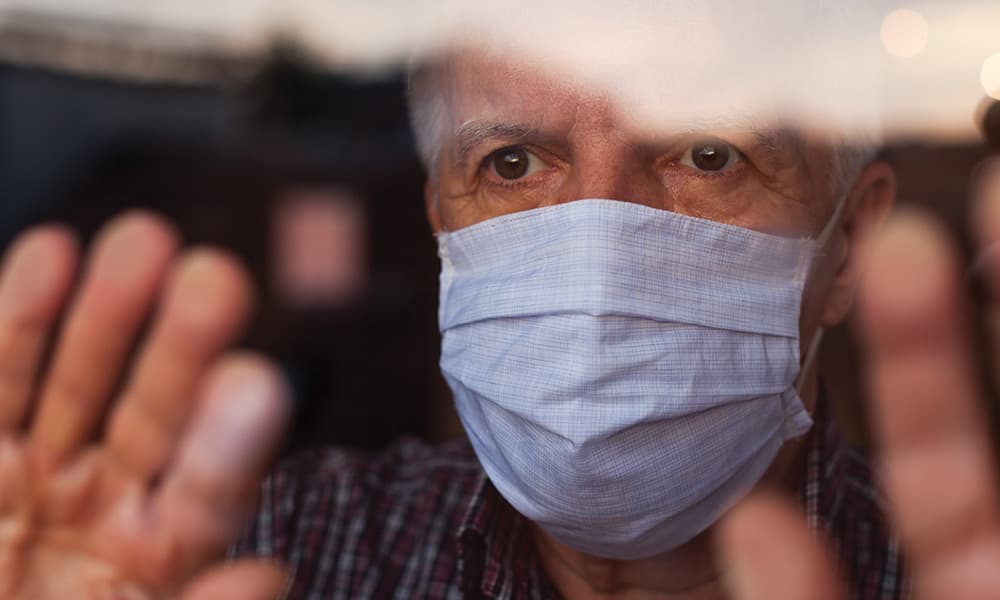Elderly people in residential care homes have been particularly affected by the pandemic and the safety measures associated with it. Isolation, loneliness, and the lack of physical touch are a few factors that have impacted their mental well-being.
The COVID-19 pandemic has been a burden for everyone. Social isolation has left its mark both physically and, most of all, mentally. Family relationships have suffered, particularly where the elderly have been involved. Family members could not see their elderly loved ones not only because of restrictions but out of a sense of responsibility. While these precautions have helped us to avoid numerous deaths, they have taken a toll on residents’ and their relatives’ emotional well-being.
Isolation and Loneliness
In residential care homes, relatives were only allowed to pick up or send necessities such as clothes on particular days, and even then, such items had to be quarantined. Food and other favourite items were not allowed to be sent. From a resident’s view, this may have brought up feelings of being neglected by their family.
The lack of physical touch only adds to the feeling of neglect. Dr Paulann Grech (senior lecturer, Department of Mental Health, University of Malta) explains that physical touch actually benefits mental and physical health. ‘Meaningful touches such as hugs and hand holding during stressful times slow down the heart rate, lower blood pressure, and decrease stress hormones. Oxytocin is released during these interactions and leads to feelings of relaxation and bonding,’ she says. Not only do these interactions help us feel good, but research has shown that soothing touch can also strengthen the immune system.
Today’s technology may have helped in reducing the psychological impact caused by the lack of physical touch, but not in all cases. Connection through technological devices also has its downsides. For instance, relatives had to find the right time to be able to connect with their loved ones, and not everyone had easy access to such technology. Not all the elderly were familiar with today’s technological devices, and those suffering from dementia and cognitive problems may have encountered difficulties communicating through these devices due to the severity of their conditions.
Apart from the lack of physical interaction and adding to the increasing frustration, only one relative per day was allowed to visit their resident and only when the resident was critically ill. This was permitted through the use of protective barriers such as separation doors or separation screens, further adding to the sense of detachment.
Psychological Struggles
According to a 2020 study, physical distancing due to COVID-19 can cause extreme mental health issues, especially in the elderly already dealing with such problems. The separation from loved ones, coupled with boredom and a loss of freedom, can cause deterioration in an individual’s mental health. Relatives were preoccupied even when residents needed to be transferred to a quarantine ward, either if found positive for COVID-19 or after attending appointments outside the residential home. Communication barriers could have been another issue for elderly persons in residential care. The increased workload on residential staff meant that it was not always easy to communicate effectively with residents and their relatives. In quarantine wards and certain residential homes, residents were not allowed to venture out of their wards or rooms. So physical interaction was also limited among the residents themselves.
This situation has led to excessive frustrations and uncertainties, increasing preoccupations for both residents and relatives and exacerbating mental stress.
This has led to increasing mental health issues across the whole population. Moreover, activities or outings were not being organised, which goes against all protocols in maintaining mental health, let alone in treating mental health issues.
Older Adults in the Community
The problems mentioned above concerning elderly people in residential facilities were only one aspect of the pandemic. The elderly living in private homes have presented somewhat bigger problems, concerns, and needs.
Family members might have been hesitant to visit their vulnerable relatives out of fear. After all, nobody wants to be responsible for unknowingly infecting their loved ones. On the other hand, relatives were increasingly worried as they could not accompany elders for appointments and in cases where they might require hospitalisation. This was not just due to the restrictions imposed. There were cases where family members ended up in quarantine, preventing them from taking care of their elders’ daily basic needs like providing food, house-keeping, and self-care.
Such situations also resulted in other concerns and worries. Elders living alone may have been in danger of feeling lonely, especially if they had problems with mobility or other health problems. This increased the need to apply for caring services, such as telecare, Meals on Wheels, and home help. In some cases, hiring private carers for 24hr services was necessary; however, this was a luxury that few could afford – especially families with additional financial burdens due to lockdowns.
Anxiety and distress can be experienced due to physical isolation at home and can induce drastic negative effects on the mental health of the elderly. In fact, WHO recommends that relatives should check on older people and take some time to talk and get involved in their daily routines.
The need to admit elders to residential care homes has increased, but at a cost. This was coupled with concerns and worries that the elderly might be at a higher risk of being infected. Admission to residential care settings has also proved somewhat difficult as such admissions had to be stopped due to the pandemic. These uncertainties only added to the fear that many, not just residents, had to grapple with.

Impact on Younger People
This fear and uncertainty may have led to relatives suffering mental health symptoms. Although such symptoms are prevalent across all ages, a recent study published in the Canadian Journal of Psychiatry stated that early anxiety symptoms in 50,000 Canadians of all ages were diagnosed during the pandemic. It also showed that younger people were at a higher risk of suffering from poor mental health. In an article by Abbott, studies done so far consistently showed that young people and people with young children are more vulnerable to psychological problems. This higher vulnerability, coupled with the increased worries for their elderly relatives, would have contributed to elevated poor mental health.
Before the pandemic, some of the elderly may have been involved in actively supporting their families, friends, and neighbours by taking care of children, groceries, cooking, and other needs. This could not be done anymore, leading to a sense of isolation, unworthiness, and a lack of purpose. Relatives would have been concerned about the possibility of depression creeping in on their elders.
Practically this was a complete social isolation situation and not just from family members. These elders could not attend any activities with their loved ones. There were not even any activities to attend as these were all cancelled. Social distancing had to be imposed in all public places such as shops or hairdressers. The world had all of a sudden become cold, and this pushed the elderly’s resilience to its limits, causing more mental health issues than ever before: a trauma whose residue is still to be experienced.
Further Reading
Abbott, A. (2021). COVID’s mental-health toll: how scientists are tracking a surge in depression. Nature, 590(7845), 194-195. doi: 10.1038/d41586-021-00175-z
El-Gabalawy, R., & Sommer, J. (2021). “We Are at Risk Too”: The Disparate Mental Health Impacts of the Pandemic on Younger Generations: Nous Sommes Aussi à Risque: Les Effets Disparates de la Pandémie Sur la Santé Mentale des Générations Plus Jeunes. The Canadian Journal Of Psychiatry, 66(7), 634-644. doi: 10.1177/0706743721989162
Galea, M., Sammut, A., Grech, P., Scerri, J., Calleja Bitar, D., & Dimech Sant, S. (2022). Psychosocial Impact of COVID-19 on Malta’s Elderly. Athens Journal Of Health And Medical Sciences, 9(1), 11-22. doi: 10.30958/ajhms.9-1-1
Data was collected over an 8 month period (April 2020 – March 2021). Each month included data from 500 participants. The study was anonymous.
Javed, B., Sarwer, A., Soto, E., & Mashwani, Z. (2020). The coronavirus (COVID‐19) pandemic’s impact on mental health. The International Journal Of Health Planning And Management, 35(5), 993-996. doi: 10.1002/hpm.3008





Comments are closed for this article!